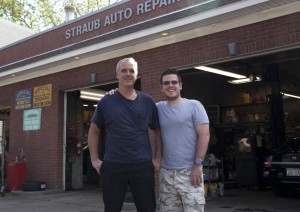The growth of bitcoin, the virtual currency, as an accepted form of payment in Westchester and Fairfield counties has been sluggish in the last year.
The Business Journal reported in June that Straub Auto Repairs in Hastings-on-Hudson became one of the first businesses to accept bitcoins from customers in the region through fund transfers with smartphones or tablets. Since then, only two businesses ”” Brennan”™s by the Beach restaurant in Stamford and Archie”™s Auto, a repair shop in Danbury ”” have started accepting the digital money, according to CoinMap, an online map of brick-and-mortar stores that take bitcoins. Those additions bring the total number of bitcoin-accepting businesses in the two counties to eight, according to CoinMap.
“It”™s not too surprising,” said Thomas Straub, a student at St. John”™s University School of Law in Queens who convinced his father to accept bitcoin at his Westchester shop, Straub Auto Repairs. “It”™s growth, but it”™ll pick up I hope.”

- Harry Straub, left, at his Hastings-on-Hudson auto repair shop with son Thomas. The shop accepts bitcoins as a form of payment. File photo
Straub is a bitcoin “miner” ”” someone who lends their computer hardware to the cause of keeping track of all the transactions completed with the currency, which has no central bank or issuing authority. As a reward for this computational heavy lifting, miners receive bitcoins, which can be converted to dollars via online exchanges.
Since the business began accepting bitcoins last year, Straub Auto has only had one customer pay with them.
“The secretary at the shop actually called me and said, ”˜We just had someone pay!”™” Straub said. “They were all excited, and the whole process was relatively painless.”
The modest bitcoin activity in retail mirrors national statistics.
CoinDesk, a news and analysis website covering bitcoin and other digital currencies, reported in January that the rate of bitcoin adoption by merchants slowed in 2014, from 16,800 new businesses accepting the currency in the first quarter to 6,000 in the fourth quarter.
But there are encouraging signs for bitcoin”™s proponents.
While Straub Auto Repairs saw a business opportunity, Archie”™s Auto in Danbury started accepting bitcoins in response to demand.
Straub and his father cited the potential to draw from a unique customer base ”” bitcoin holders in need of auto repairs ”” as one of the reasons for getting the shop on board with the currency. That customer base led Archie”™s to accept bitcoins.
Eda Fieschi, who owns the Danbury shop with her husband, decided to implement a bitcoin payment system after getting a request from a customer who was a college student. Since the shop started taking the currency in September, it has had six customers pay in bitcoins, all students from nearby Western Connecticut State University, Fieschi said.
She attributed the lack of bitcoin”™s adoption by businesses in the suburbs to hesitancy that comes with new technology as well as a lack of publicity.
“It”™s just because people don”™t know about it,” she said, comparing the use of bitcoins now to the use of Facebook a decade ago. Back then, it was rare for businesses to use Facebook for marketing, Fieschi said, but now it is basically a requirement for a company to have a Facebook page.
Straub agreed, tying adoption rates to familiarity with the technology.
“I think the issue is the merchants not understanding how they can take it, and a lot of them are worried about the exchange risk if they”™ve even heard of it at all,” he said.
Bitcoins”™ value in dollars has surged and dropped dramatically in response to major coverage by mainstream media, but volatility risk for retailers can be eliminated with software that can instantly convert bitcoins to dollars at the time of transaction.
Straub said adoption by major retailers could help set an example.
Microsoft, Dell, Dish Network and Expedia are among the companies that now take bitcoin payments in some capacity.
“Hopefully those companies take the lead and then smaller businesses will be more inclined,” Straub said.
CoinDesk in its report forecast that the number of merchants accepting bitcoin will grow to more than 140,000 this year. The report also noted a record-setting amount of venture capital invested in bitcoin startups in the fourth quarter ”” $130 million, more than double the $64 million raised in the third quarter.
Straub painted a picture of the financial future if bitcoins are propelled into the mainstream, describing the logos of accepted payment methods found on storefronts or online checkout pages. “I think you”™ll see MasterCard, American Express and then bitcoin,” he said.


















